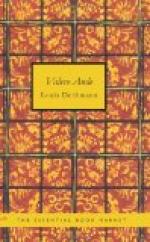Boerhaave, it appears, conceived the idea of a sort of posthumous pleasantry, of a distinctly lucrative nature, at the expense of his medical brethren. Professional ignorance and popular superstition had alike surrounded his name with a halo of mystery and he was credited with almost miraculous powers of healing and the possession of the Secret of Disease and Health.
At the sale of effects, following his death, there was a great gathering of the most celebrated physicians of the day and his books and records fetched fabulous prices. But one special tome, ponderous, silver-clasped and locked, entitled: “Macrobiotic, The True and Complete Secret of Long, Healthy Life,” was the cynosure of every avaricious eye. The auctioneer shrewdly reserved it until the last. Amidst a scene of unparalleled excitement and competition the Great Book was at length knocked down to a famous London physician for no less a sum than seven thousand Gulden. When opened with eager anticipation before the disappointed bidders, its pages were found to be blank—with one exception. Upon this one was inscribed in the handwriting of Boerhaave himself, only these ten words:
“Keep the head cool, the feet warm, the bowels open.”
Turning to an excited audience it was thus the great London authority spoke:
“I once heard it said that the world is simple; that health is simple; that it is the folly of man that causes all complications, and that it is the delicate task of the true physician to reduce everything to its original simplicity. Heaven knows that our great Master, Boerhaave, has solved life’s problem. To me this truth is well worth the 7,000 Gulden I pay to secure it; while to you, my friends, who have travelled from distant parts of the globe in search of it, receive from me the legacy of our Master and also be, likewise, content.”
The moral that this story teaches is the same eternal lesson of all time, as expressed through the medium of Biology: that not by art or artifice can health be cheaply snatched at will from the Infinite Sources of Life, but that by consistently following the guidance of Nature’s Laws the healthy functions of the human organism may alone be correctly maintained, or, when driven by ill-treatment into decline, it is the rational scientific assistance we afford to the efforts of Nature, by which alone we may hope to re-establish that normal condition of health. For, in the worthy words of Wordsworth I may say: “So build we up the being that we are.”
The writer does not claim for this method so great a degree of simplicity. But he does base it upon the same truth that simplicity and a return to natural conditions are the only ways of effectively healing the diseased body.
Guided by the great masters of biology and physiological chemistry, his object has been to determine the elements of which the twelve main tissues of the human body are composed and to learn in what manner these tissues suffer from the various diseases which attack them.




